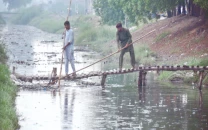The refugee crisis; the power of social media
The UN, Germany, and Europe as a whole, have been hailed as the saviours of refugees

This was the scene when a train of refugees stopped in Hungary and the refugees were ‘escorted’ to the border by the Hungarian police. It’s enough to make humanity scream.
The refugee experience in disparate regions of Europe is quite varied. Besides bodies washing up on beaches and being forced to run in the dark, there is a section of Syrian refugees which has made use of social media to make the migratory journey somewhat more organised. CNN’s Ivan Watson noted that Syrian youth is making use of the internet, Facebook in particular, to issue distress calls while they’re at sea. They have the phone numbers of the Greek and Turkish police and once they arrive at their desired destination, they know exactly where to go and what to do.
The UN, Germany, and Europe as a whole, have been hailed as the saviours of refugees. However, the silent saviour has been the social media. There are various Facebook pages that provide crucial information to refugees, which include instructions on what they should carry during their journey and which officials they should contact. There are numerous groups on Facebook such as the ‘Syrian Refugee Helpers in Istanbul’, which allow volunteers and activists to gather on a single platform and organise their efforts effectively in order to cater to the needs of refugees.
Social media has allowed the world to evolve into a global community. People from all over the world are getting in touch with European volunteers on Twitter and are flying in from Libya, Jordan and the US to help refugees in whatever manner they can. The traditional media has also been in step with their journey. This provides an interesting opportunity for European officials who are struggling to identify and register refugees. Why not incorporate the help of social media websites, such as Facebook, to reach out to refugees and issue announcements, information and warnings? Why not delineate, through the use of social media, the safest routes of travel? Why not warn refugees against high tides and instruct them on ways to stay alive at sea. Why not create an online platform for refugees and volunteering families to get in touch with each other?
It’s 2015. We can do more. We should do more.
Published in The Express Tribune, September 25th, 2015.



















COMMENTS
Comments are moderated and generally will be posted if they are on-topic and not abusive.
For more information, please see our Comments FAQ